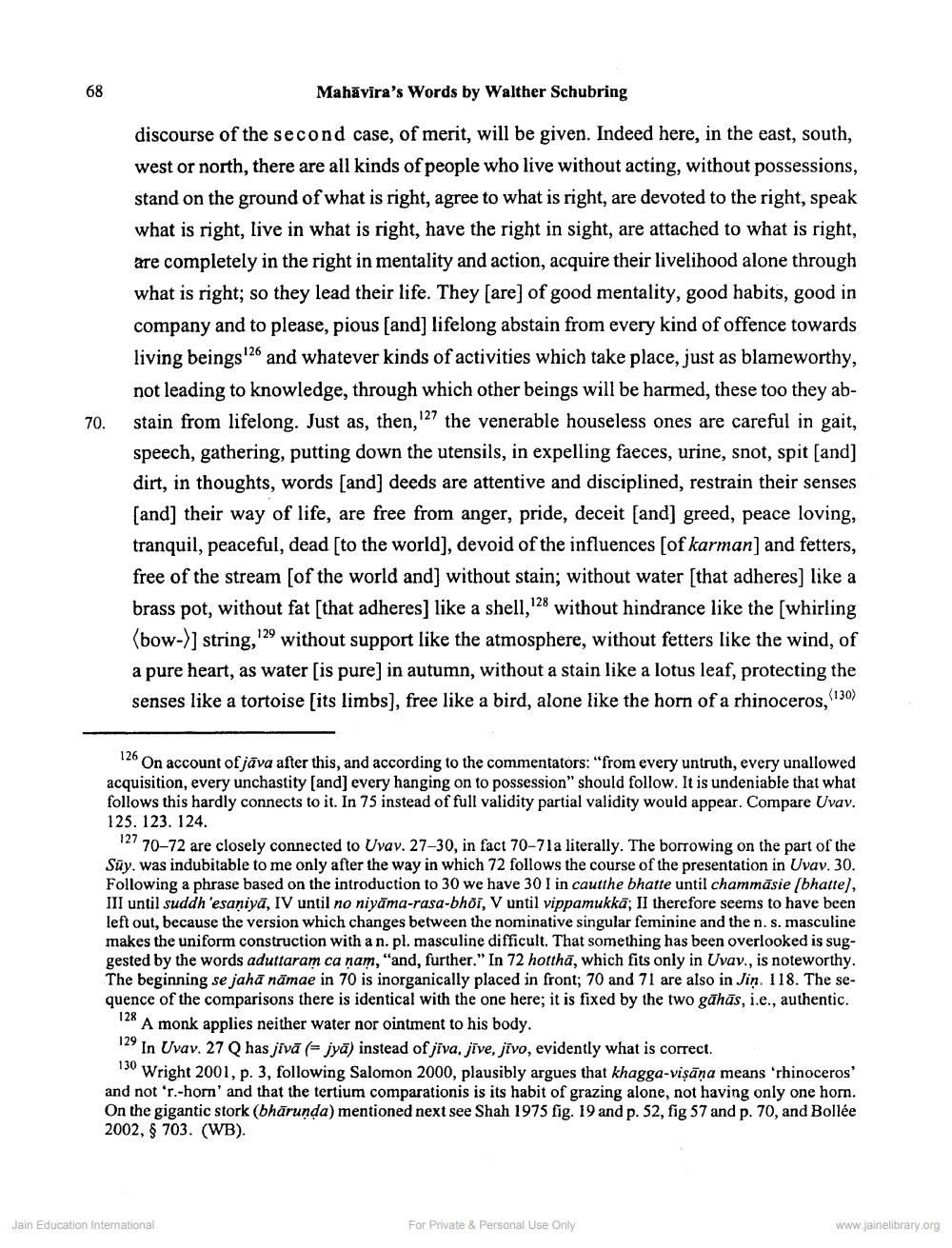________________
Mahāvīra's Words by Walther Schubring
70.
discourse of the second case, of merit, will be given. Indeed here, in the east, south, west or north, there are all kinds of people who live without acting, without possessions, stand on the ground of what is right, agree to what is right, are devoted to the right, speak what is right, live in what is right, have the right in sight, are attached to what is right, are completely in the right in mentality and action, acquire their livelihood alone through what is right; so they lead their life. They (are] of good mentality, good habits, good in company and to please, pious [and] lifelong abstain from every kind of offence towards living beings and whatever kinds of activities which take place, just as blameworthy, not leading to knowledge, through which other beings will be harmed, these too they abstain from lifelong. Just as, then,!27 the venerable houseless ones are careful in gait, speech, gathering, putting down the utensils, in expelling faeces, urine, snot, spit [and] dirt, in thoughts, words [and] deeds are attentive and disciplined, restrain their senses [and] their way of life, are free from anger, pride, deceit [and] greed, peace loving, tranquil, peaceful, dead (to the world), devoid of the influences (of karman) and fetters, free of the stream [of the world and) without stain; without water (that adheres) like a brass pot, without fat (that adheres) like a shell, 128 without hindrance like the (whirling (bow-] string, 129 without support like the atmosphere, without fetters like the wind, of a pure heart, as water is pure) in autumn, without a stain like a lotus leaf, protecting the senses like a tortoise [its limbs), free like a bird, alone like the horn of a rhinoceros, (130)
126 On account of jāva after this, and according to the commentators: "from every untruth, every unallowed acquisition, every unchastity (and) every hanging on to possession" should follow. It is undeniable that what follows this hardly connects to it. In 75 instead of full validity partial validity would appear. Compare Uvav. 125. 123. 124.
127 70-72 are closely connected to Uvay. 27-30, in fact 70-71a literally. The borrowing on the part of the Sūy. was indubitable to me only after the way in which 72 follows the course of the presentation in Uvav. 30. Following a phrase based on the introduction to 30 we have 30 I in cautthe bhatte until chammāsie (bhatte), III until suddh'esaniyā, IV until no niyāma-rasa-bhoi, V until vippamukkā; II therefore seems to have been left out, because the version which changes between the nominative singular feminine and the n. s. masculine makes the uniform construction with a n. pl. masculine difficult. That something has been overlooked is suggested by the words aduttaram ca nam, "and, further." In 72 hotthā, which fits only in Uvav., is noteworthy. The beginning se jaha nämae in 70 is inorganically placed in front; 70 and 71 are also in Jin. 118. The sequence of the comparisons there is identical with the one here; it is fixed by the two gāhās, i.e., authentic. 12* A monk applies neither water nor ointment to his body.
- In Uvav. 27 Q has jivā (= jyā) instead of jiva, jive, jivo, evidently what is correct. 150 Wright 2001, p. 3, following Salomon 2000, plausibly argues that khagga-vişāņa means 'rhinoceros' and not 'r.-horn' and that the tertium comparationis is its habit of grazing alone, not having only one horn. On the gigantic stork (bhārunda) mentioned next see Shah 1975 fig. 19 and p. 52, fig 57 and p. 70, and Bollée 2002, $ 703. (WB).
Jain Education International
For Private & Personal Use Only
www.jainelibrary.org




